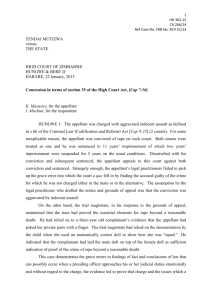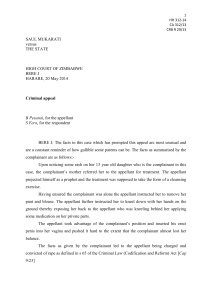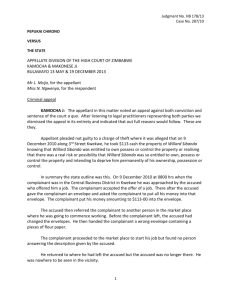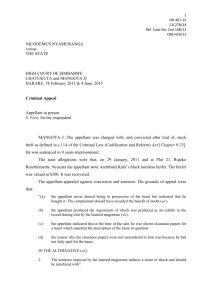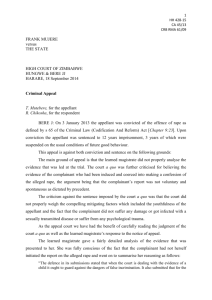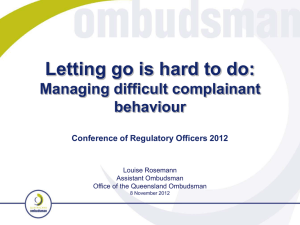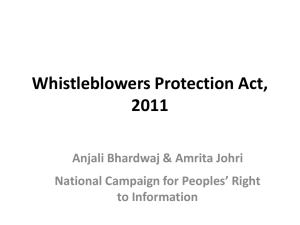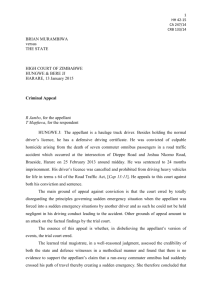HB 119-15 HCA 631-13 WILFORD NCUBE V THE STATE
advertisement
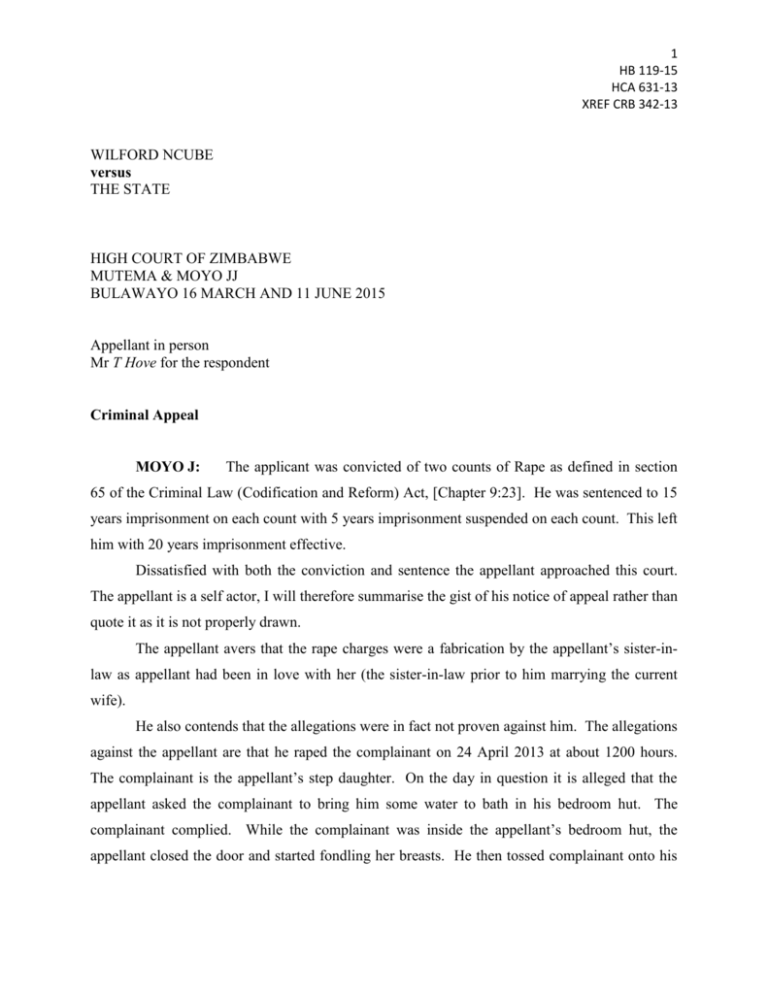
1 HB 119-15 HCA 631-13 XREF CRB 342-13 WILFORD NCUBE versus THE STATE HIGH COURT OF ZIMBABWE MUTEMA & MOYO JJ BULAWAYO 16 MARCH AND 11 JUNE 2015 Appellant in person Mr T Hove for the respondent Criminal Appeal MOYO J: The applicant was convicted of two counts of Rape as defined in section 65 of the Criminal Law (Codification and Reform) Act, [Chapter 9:23]. He was sentenced to 15 years imprisonment on each count with 5 years imprisonment suspended on each count. This left him with 20 years imprisonment effective. Dissatisfied with both the conviction and sentence the appellant approached this court. The appellant is a self actor, I will therefore summarise the gist of his notice of appeal rather than quote it as it is not properly drawn. The appellant avers that the rape charges were a fabrication by the appellant’s sister-inlaw as appellant had been in love with her (the sister-in-law prior to him marrying the current wife). He also contends that the allegations were in fact not proven against him. The allegations against the appellant are that he raped the complainant on 24 April 2013 at about 1200 hours. The complainant is the appellant’s step daughter. On the day in question it is alleged that the appellant asked the complainant to bring him some water to bath in his bedroom hut. The complainant complied. While the complainant was inside the appellant’s bedroom hut, the appellant closed the door and started fondling her breasts. He then tossed complainant onto his 2 HB 119-15 HCA 631-13 XREF CRB 342-13 bed and forcibly had sexual intercourse with complainant once. He then instructed complainant not to tell anyone and threatened to strike her with an axe if she told anyone about the incident. On 28 April 2013, the appellant again called the complainant to give him water to drink in his bedroom hut. The complainant complied and upon entering the appellant’s bedroom hut, the appellant asked her to sit on his bed but complainant refused. The appellant then grabbed the complainant and forced her to sit on the bed before fondling her breasts. The appellant then forcibly lay complainant on the bed and raped her once. He thereafter instructed her not to tell anyone and threatened to strike her with an axe if she did. On both occasions, complainant and the appellant were the only people at the homestead. In his defence outline the appellant stated that the complainant’s aunt was jealous of him as he looked after Lewis’ cattle and earned a living from selling milk from Lewis’ cows.. He also stated that the complainant’s aunt whose name is Nomusa said he (appellant) bragged about selling milk from Lewis’ cattle. He also stated that perhaps the other reason for fabricating the allegations against him could be that Nomusa wanted him to marry her or have an affair with her. The report of the alleged rape was made to Nomusa, the complainant’s aunt, as her arm that was twisted by the accused during the ordeal was painful so she had to tell her aunt about the painful arm in the fields as they picked some melons and some round nuts. She told the court that she told her aunt so that the aunt could tell the mother what had transpired. Nomusa Sibanda, the aunt to whom the alleged rape was reported to, confirmed that the complainant reported the rape to her in the fields when she (complainant) complained of a painful arm. Nomusa also told the court that the complainant reported the sexual assault to her on a Tuesday when she had been raped for the second time on the previous Sunday. She denied any malicious intentions against the appellant whatsoever and in fact during cross-examination the appellant asked her the following question: Q: I put it to you, you used to visit me. We never hated each. A: That is true, I have never hated you. Even up to now I have nothing against you. It is only the child (complainant) who raised the allegations against you. It is clear from this question and answer that there was no bad blood between Nomusa Sibanda and the appellant 3 HB 119-15 HCA 631-13 XREF CRB 342-13 The appellant, when cross-examining the complainant and the complainant’s mother sought to show that the bath water was served to him by the complainant’s mother and not the complainant but later under cross-examination he admitted that in fact it was the complainant who had served him with bath water. The alleged rape accounts took place on 24 and 28 April 2013 respectively and the medical examination was conducted on 7 May 2013. The doctor noted that the hymen had tears that were in the process of healing. He concluded that penetration was very likely. This is a straightforward case where the complainant’s account together with that of the other two witnesses, was vivid, and the medical evidence also supported the complainant’s allegations. The appellant’s defence of malice by Nomusa, the complainant’s aunt, fizzled out during the trial as Nomusa clearly proved that she had cordial relations with the appellant. She even told the court that it is the child who raised allegations of rape against the appellant. Subsequently, even the appellant himself acknowledged that between himself and Nomusa there was no hatred. Again, the appellant, despite his initial attempts to vehemently deny that the complainant ever gave him bath water, he subsequently admitted to this during crossexamination. “It is trite in our law that an appellate court will not interfere with findings of fact made by a trial court and which are based on the credibility of witnesses. The reason for this is that the trial court is in a better position to assess the witnesses from its vantage point of having seen and heard them. See Hughes v Graniteside SC 13/84. The exception to this rule is where there has been a misdirection or a mistake of fact or where the basis upon which the court a quo reached its decision was wrong.” Per ZIYAMBI JA in the case of Moses Chimbwanda v Irene Chibwanda SC 28/02. No misdirection has been shown in the decision of the court a quo. Neither can the factual findings made by it be found wanting. In fact, it is our view that the trial court carefully assessed the evidence before it and that the resultant conviction of the appellant by the court a quo was indeed the only logical conclusion the trial magistrate could have arrived at in the circumstances. We are satisfied that the appellant’s guilt in this matter was indeed proven beyond any reasonable doubt and we accordingly find that the conviction was safe. The appeal against conviction accordingly fails. 4 HB 119-15 HCA 631-13 XREF CRB 342-13 Ad sentence It is our considered view that a sentence of 15 years imprisonment per count on the two counts, with 5 years imprisonment suspended per count on the usual conditions, meets the justice of this case for the reasons that no valid grounds have been established in this matter which would justify an interference with the sentence imposed by the court a quo. Refer to the case of S v Mamvura SC 22/05. Moyo J……………………………………………………. Mutema J agrees……………………………………………. National Prosecuting Authority’s Office, respondent’s legal practitioners
